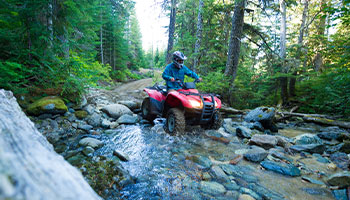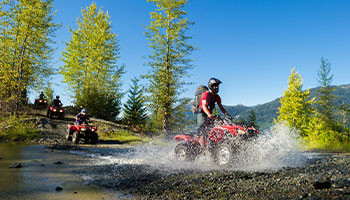Few experiences are more thrilling than adventuring through rugged trails on an all-terrain vehicle (ATV). However, with such a rush of adrenaline comes a level of risk that should not be taken lightly. ATV insurance is more than a safety net—it’s a crucial piece of responsible riding. In this blog, we’ll cover six reasons why securing ATV insurance is not only a wise decision but a necessary one for an ATV enthusiast. From protecting your initial investment to ensuring peace of mind, understanding the importance of ATV insurance can transform your off-roading adventures into worry-free journeys.
What is ATV Insurance?

Like a traditional auto or motorcycle policy, ATV insurance provides financial protection against damage or injuries caused by an accident. However, a key difference is that most states do not require ATV insurance. Regardless, ATV insurance is still worth considering due to the rough terrain you will likely face while riding, which could lead to an accident that causes significant damage or injury.
ATV insurance coverage amounts will ultimately depend on your needs and state requirements, if applicable. Coverages will typically look familiar to traditional auto insurance, which can include bodily injury and property damage liability, collision and comprehensive coverage, medical payments, and uninsured/underinsured motorist coverage.
A common misconception many riders have is that their ATV has some form of protection under their auto or homeowners policy. While homeowners insurance could provide some protection—depending on your policy and coverage—if someone is injured on your property, it will not offer any protection when you’re out riding on land outside your property.
Why Should I Purchase ATV Insurance?
1. Legally Required in Your State
Unlike auto insurance, most states do not legally require you to purchase ATV insurance. However, a few situations could cause you to buy coverage even if it is not legally required in your state. Some parks, for example, may require riders to carry liability insurance to ride on their trails. If you are financing your ATV, your lienholder may also require you to have comprehensive and collision coverage until you pay off the loan.
As of this writing, the following states require ATV insurance in some form:
| 1. Alaska | 5. Iowa | 9. New Mexico | 13. Utah |
| 2. Arizona | 6. Louisiana | 10. New York | 14. Washington |
| 3. Idaho | 7. Nebraska | 11. Pennsylvania | 15. West Virginia |
| 4. Illinois | 8. New Jersey | 12. South Dakota | 16. Wyoming |
2. Prone to Injuries

Due to the nature of ATVs and the trails they are typically operated on, having ATV insurance will keep you financially protected if you are injured while riding. According to the U.S. Consumer Product Safety Commission, there are more than 800 deaths and an estimated 100,000 emergency department-treated injuries involving ATVs each year. The most common injuries related to ATVs are concussions, broken bones, and spinal trauma. Although you should always wear safety equipment while riding, the equipment you have on will not always prevent injury if you are involved in a severe crash.
3. Your Travel to Ride Frequently
Even if your state does not require ATV insurance, others do. Suppose you plan to take your adventures across state lines. In that case, the last thing you’d want is to arrive at a new location only to learn you cannot ride due to your lack of insurance. An active ATV insurance policy will ensure you can always ride on any trail you choose. Plus, some areas may have rougher trails than the ones you are used to in your home state, which could open the door to accidents or mishaps while riding them for the first time.
4. Theft and Asset Protection
If you’ve purchased the ATV of your dreams, chances are that it wasn’t cheap. Due to their high value and ease of loading onto a truck bed or trailer, ATVs can quickly become a target for would-be thieves. Although an ATV insurance policy won’t physically prevent theft, it can help you replace an ATV after the fact. Like auto insurance, comprehensive ATV insurance will financially help you if your ATV is vandalized or stolen.
If you decide to carry comprehensive coverage for your ATV, it’s also a good idea to purchase collision coverage. Collision coverage will help you repair or replace your ATV after an accident. Liability insurance, which covers injuries or damage you cause, will only apply to the property of others, not your own. By having multiple coverages on your ATV policy, you’ll have well-rounded protection that will protect you in most scenarios you may find yourself in.
5. Uninsured Riders
Although ATV insurance is required in some states and parks, that doesn’t necessarily mean every rider will have the appropriate amount of insurance, if at all. If an uninsured rider collides with you and causes extensive damage, you could be left to cover any repair, medical, or replacement costs yourself. Uninsured/underinsured motorist coverage will protect you in such scenarios by providing coverage for your injuries or damages caused by inadequately insured rides.
6. ATV Insurance Affordability

Unlike traditional motorcycle insurance, ATV insurance is typically a lot more affordable. For one, riders usually spend less time and drive fewer miles on ATVs than on motorcycles, which means fewer accidents and claims. According to Value Penguin, ATV insurance costs about $100 annually for liability-only coverage and around $300 for full coverage on average. However, the actual amount you will pay for coverage will depend on factors such as your age, location, ATV, and usage frequency. Even if these figures sound high, they are significantly less than what repairing or replacing your ATV will cost after a serious accident. When purchasing an ATV, consider insurance costs as part of the sticker value.
Speak to a Specialist to Learn More
Need more information regarding how to get ATV insurance? AIS can help. With over 55 years of experience navigating the insurance market, our team of specialists can assist you with reviewing your options and finding a policy that works best for you. As with other insurance types, comparing quotes from multiple providers will help you find the best rate available. Our team can help you compare quotes from our network of providers for free, helping you find reliable coverage you can count on. To learn more, give us a call at (800) 449-8943.
The information in this article is obtained from various sources and offered for educational purposes only. Furthermore, it should not replace the advice of a qualified professional. The definitions, terms, and coverage in a given policy may be different than those suggested here. No warranty or appropriateness for a specific purpose is expressed or implied.


